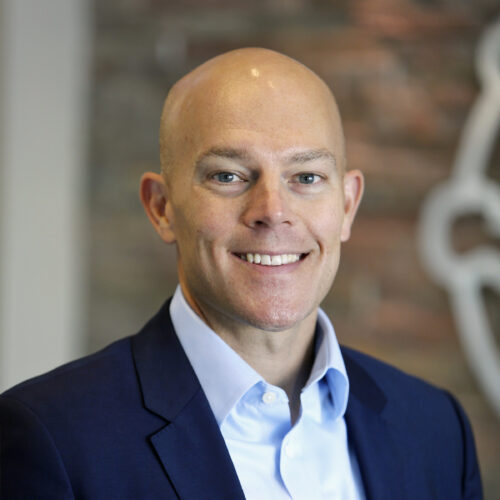Distinguished Alumnus: A career in HHS is an ‘opportunity to give back, to help people’

Scott HuttonPhoto provided
Written by: Tim Brouk, tbrouk@purdue.edu
Two years ago, healthcare companies nationwide pivoted to the mission of understanding and preventing the spread of COVID-19. Biodesix was one of them.
Led by Scott Hutton, Biodesix CEO and Purdue University Department of Health and Kinesiology (HK) alumnus, the lung-focused diagnostic testing company based in Colorado already had much of the technology and team know-how to help with testing for the coronavirus.
“We wanted to do our part. That’s the simplest way to put it,” said Hutton from his home in Boulder, Colorado.
Prior to the pandemic, Biodesix’s main work was with lung cancer patients, both in testing for and mapping out treatment plans for patients diagnosed with the disease. The shift to temporary COVID-19 testing was effective with the original virus strain, which presented itself with pneumonia-like or acute respiratory distress syndrome symptoms. The same doctors that were connecting daily with Biodesix for lung cancer testing were then reaching out for COVID-19 testing.
But since spring 2020, Hutton shifted back to what his company does best — providing diagnoses of lung disease. Hutton and his team have developed products and methods that analyze and perform blood-based diagnostic testing. This work and his passion for Purdue earned him an Old Masters award in 2021 and a 2022 Purdue College of Health and Human Sciences (HHS) Distinguished Alumni Award.
“A couple of our products are pre-cancer diagnosis where we’re trying to help the physicians identify if it is a cancer or not,” Hutton explained. “Then, we have products for when someone is diagnosed with cancer; they give insights into how aggressive the cancer is and how a patient’s immune system is responding. All of that information will help inform them as they think of what treatment to prescribe.
“I don’t think a lot of people realize that lung cancer is still the deadliest form of cancer in the U.S. More people in the United States annually die from lung cancer than they do prostate, breast and colon/rectal cancers combined.”
Hutton credited Purdue for his career path. The Greenwood, Indiana, native knew he was in for a rigorous but fulfilling learning experience before he even had taken his first classes in 1990.
“Purdue just had an incredible reputation,” said Hutton, who was a member of Sigma Chi fraternity. “It was a belief that if I came to Purdue, I’d be surrounded by really, really incredible people, and that proved to be the case. When I was there, I really was surrounded by the best and brightest.”
Thirty years later, Hutton has kept his passion for healthcare that was first ignited at Purdue.
“You’re pursuing a career in HHS because you see the opportunity to give back, to help people,” Hutton said. “Having a fulfilling career where you can give back and you can see the impact that you can make, that’s extremely fulfilling and enriching. It’s not just a job. I’ve been fortunate enough to be in a position where I can see the positive impact of the work I and the teams I’ve been a part of have contributed to. I’ve seen patients’ lives and their family members’ lives positively impacted. There’s just something about that that gives you a deeper connection to your work. There’s great fulfillment in that, and I think that’s one of the things that is common for the majority of us in HHS. We see that. We’re motivated by that, and that’s what has drawn us to HHS.”
Discover more from News | College of Health and Human Sciences
Subscribe to get the latest posts sent to your email.